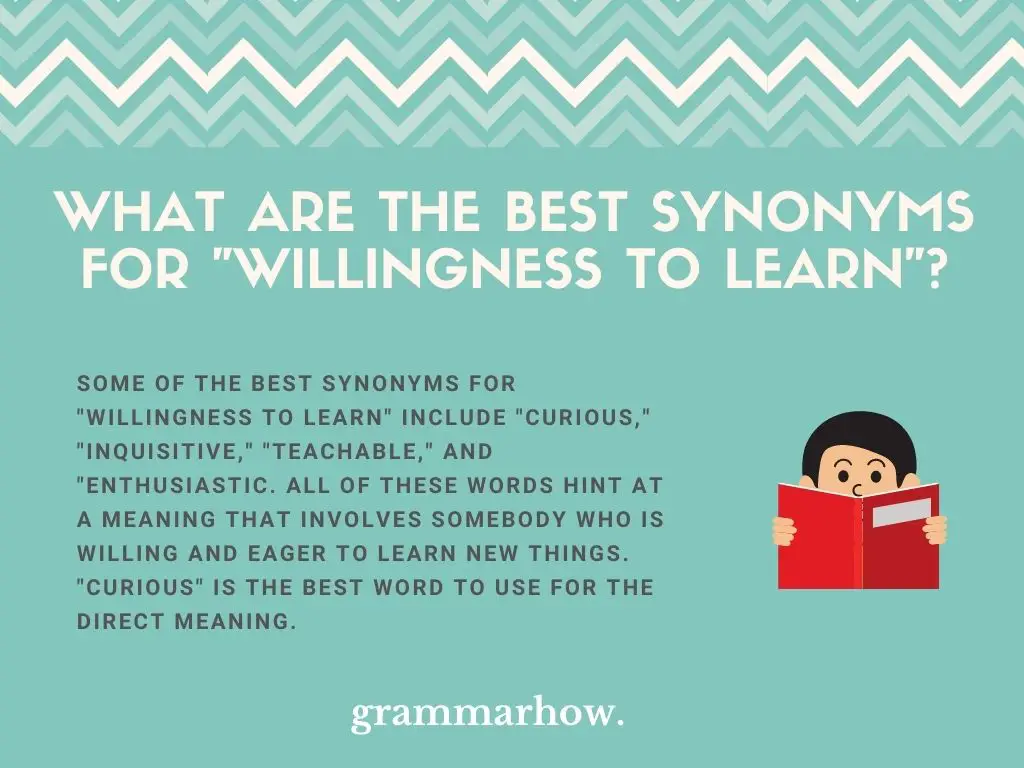Finding the correct word for eager to learn doesn’t have to be a challenge. It’s great to expand your vocabulary and broaden your knowledge if you can put a word to a description. In this article, we’ll look at good words for a willingness to learn and how to use them.
What Are The Best Synonyms For “Willingness To learn”?
Some of the best synonyms for “willingness to learn” include “curious,” “inquisitive,” “teachable,” and “enthusiastic. All of these words hint at a meaning that involves somebody who is willing and eager to learn new things. “Curious” is the best word to use for the direct meaning.
According to The Cambridge Dictionary, the definition of “curious” is “interested in learning about people or things around you.”
So, in this article, we’ll look at the following words and how they relate to the phrase “willingness to learn:”
- Curious
- Inquisitive
- Teachable
- Enthusiastic
Curious
“Curious” is by far the most compatible word with the meaning we’re looking for. You can use it to mean precisely that somebody is willing to learn about something.
Someone that is “curious” is interested in learning new things. Those things can be about people or things, and the curious person is always interested to find out more.
For the most part, “curious” is a positive adjective we can use to describe somebody who is willing to learn new things. It’s a great way to use a quick and easy word to convey your meaning.
- I’m curious about history, so I asked my teacher for more textbooks.
- He was curious about what was inside the cave and found some amazing things.
- My children have always been curious souls. They’re constantly finding new things to entertain themselves with.
- You’re a curious being, aren’t you!
As you can see, “curious” is a great word to use when talking about somebody who is willing to learn all about new things. You’ll usually use it in a positive way, though that isn’t always the case.
Sometimes, “curious” is used as a negative adjective. That means that people might call someone “curious” who’s a little too eager to learn about new things. While it’s usually good to be happy to learn about things, some people go overboard and put themselves in danger to learn.
You may have heard the old idiom:
- Curiosity killed the cat.
It’s this idea that sometimes lets “curious” be painted in a negative light.
Inquisitive
Next, we want to talk you through “inquisitive.” It’s another great synonym to use and is definitely up there with “curious.” Many people like to use “inquisitive” as a way to talk about somebody who is willing to learn.
“Inquisitive” means that somebody wants to discover and explore new possibilities. They always have a thirst to try new things and won’t rest until they’ve satisfied that thirst.
According to The Cambridge Dictionary, the definition of “inquisitive” is “wanting to discover as much as you can about things.”
Just like “curious,” “inquisitive” comes with both positive and negative connotations. For the most part, it’s a very positive adjective that you can use to describe somebody who is willing to learn all kinds of new things about the world and the people around them.
- I like to be inquisitive about new things and don’t stop learning until I’ve mastered them (which will never happen)!
- He’s so inquisitive about things. You honestly will never beat him at a strategy game.
- You’re the most inquisitive person I’ve ever met. You’ll find a way to appeal to the masses.
- He’s far too inquisitive to be kept here at the office! You need a grander job that appeals to your capabilities.
“Inquisitive” is a great word to use to talk about somebody who is willing to learn. Usually, “inquisitive” people are slightly more impressive than “curious” people because they often have a tactical thought process or are capable of more critical thinking skills.
Generally, “inquisitive” people are also “intelligent” people, while “curious” people might simply be interested in learning new things.
However, “inquisitive” can also be used negatively. You might find yourself calling someone “too inquisitive” when their eagerness to learn about new things annoys you.
In fact, The Cambridge Dictionary definition in full looks like this:
- wanting to discover as much as you can about things, sometimes in a way that annoys people
Teachable
“Teachable” is another great word to use as a replacement to “willingness to learn.”
“Teachable” is used as an adjective to mean that somebody is capable of being taught new things. It usually implies that they’re willing to learn all about new things, making them an easy candidate to teach.
According to The Cambridge Dictionary, the definition of “teachable” is “able to be taught; that can be taught.”
Most of teaching works better when the people you’re teaching are receptive to what you’re saying. If they’re intent on listening and learning, then someone will have a much better time learning from you. It’s these teachable people that make it worthwhile to be a teacher.
- He’s such a teachable student; I couldn’t ask for someone better!
- You’re so teachable. I always have fun studying and teaching with you.
- My teacher said I’m a teachable pupil.
Enthusiastic
Finally, let’s look at “enthusiastic.” This is a great synonym to use, but it doesn’t always relate to a willingness to learn. Enthusiasm can extend to a wide variety of things in life.
“Enthusiastic” means that somebody is eager to do new things. It doesn’t always have to be learning. You can be enthusiastic about a new hobby or a new sport.
According to The Cambridge Dictionary, the definition of “enthusiastic” is “showing enthusiasm.” This means that someone is eager to learn all about new things.
- I’m an enthusiastic person when I’m introduced to new ideas.
- They’re so enthusiastic, and I can’t believe how happy they are to learn about such a boring subject!
- You’re so enthusiastic about school all the time!
While it doesn’t strictly refer to a willingness to learn, it can still be used correctly in that context. That makes it an excellent candidate to use as a synonym.
Martin holds a Master’s degree in Finance and International Business. He has six years of experience in professional communication with clients, executives, and colleagues. Furthermore, he has teaching experience from Aarhus University. Martin has been featured as an expert in communication and teaching on Forbes and Shopify. Read more about Martin here.
Asked by: Marisa Johnston
Score: 4.9/5
(75 votes)
What is willingness to learn? Willingness to learn is a key behaviour that helps us get on in life, whether personally or professionally. Simply put, it’s being open to – or seeking out – new experiences, skills and information that improve our abilities and enjoyment. We demonstrate learning from an early age.
What is a word for willingness to learn?
Having a willingness and capacity to learn is teachability: teachable adj. Capable of being taught: teachable skills. Able and willing to learn: teachable youngsters.
What is a word for always wanting to learn?
eagerness to learn; studiousness; inquisitiveness; thirst for knowledge; appetite for knowledge.
How do you describe someone who is willing to learn?
fertile mind eager to learn or know; inquisitive.
What do you call a person who loves to learn?
A philomath (/ˈfɪləmæθ/) is a lover of learning and studying. The term is from Greek philos (φίλος; «beloved», «loving», as in philosophy or philanthropy) and manthanein, math- (μανθάνειν, μαθ-; «to learn», as in polymath).
38 related questions found
What is a Hippophile?
noun. one who loves horses.
What is a Melomaniac?
Medical Definition of melomaniac
1 : an individual exhibiting melomania. 2 : an individual (as a person or dog) that is inordinately and abnormally affected by musical or other tones in certain ranges of sound.
How can I improve my willingness to learn?
Follow these steps to show your supervisor you’re willing to learn and improve yourself:
- Ask plenty of questions. …
- Demonstrate your passion for gaining new skills. …
- Earn certifications and take additional courses. …
- Request information about training and growth opportunities. …
- Pitch new ideas based on your research.
How do you say I am willing to learn?
How to demonstrate a willingness to learn on a resume
- Highlight both hard and soft skills. …
- List additional certifications and credentials. …
- Describe the results of learning new skills. …
- Provide specific examples of your accomplishments. …
- Give examples of your professional development. …
- Entry-level example.
What do you call someone who never stops learning?
Autodidact. According to Oxford Dictionary, it means “A self-taught person.” Formed out of English word Auto (self) and Greek word didact (teach). In other terms, someone who has acquired knowledge or learned a subject without seeking help from a teacher or formal education institution.
What do you call someone who is good at finding things?
If someone calls you perceptive, they mean you are good at understanding things or figuring things out. Perceptive people are insightful, intelligent, and able to see what others cannot. Perceive means «to see»; so, perceptive is a word to describe someone who is good at seeing.
What do you call someone who is hungry for knowledge?
inquisitiveness; eagerness to learn; thirst for knowledge; appetite for knowledge; desire to know; lust for learning.
What is the word for willing to do anything?
Some common synonyms of willing are deliberate, intentional, and voluntary. While all these words mean «done or brought about of one’s own will,» willing implies a readiness and eagerness to accede to or anticipate the wishes of another.
What is a word for thirst for knowledge?
synonyms for thirst for knowledge
curiousness. eagerness. investigation. meddling. nosiness.
How do you say continue to learn?
to continue learning synonym | English Thesaurus
- 1 abide, carry on, endure, last, live on, persist, remain, rest, stay, stay on, survive.
- 2 go on, keep at, keep on, keep one’s hand in, keep the ball rolling, keep up, maintain, persevere, persist in, prolong, pursue, stick at, stick to, sustain.
What does it mean to learn new things?
Learning something new. Noun. A systematic study to establish facts and reach new conclusions.
What is a good word to learn?
Top 100 Vocabulary Words That Adults Should Know
- Acquiesce.
- Acronym.
- Ambiguity.
- Analogy.
- Anachronism.
- Andragogy.
- Antithesis.
- Antonym.
Is Willingness a skill?
Being willing to learn is an essential prerequisite for career progression. To move forward, it’s important to train and develop your skills. But also to learn about your business, and the industry in which it operates. Even if you stay in the same job, the tools and procedures you use will change over time.
Why should hire you Example answer?
“Honestly, I possess all the skills and experience that you’re looking for. I’m pretty confident that I am the best candidate for this job role. It’s not just my background in the past projects, but also my people skills, which will be applicable in this position.
How can I learn to work quickly?
Science proves there are six ways you can learn and retain something faster.
- Teach Someone Else (Or Just Pretend To) …
- Learn In Short Bursts of Time. …
- Take Notes By Hand. …
- Use The Power of Mental Spacing. …
- Take A Study Nap. …
- Change It Up.
Can u be addicted to music?
While there’s little fault to find with those effects, some question whether people can enjoy music a bit too much. The short answer to this is no: Experts don’t formally recognize music addiction as a mental health diagnosis.
What is a moon lover called?
Selenophile — A person who loves the moon.
What is a music addict called?
Noun. melomaniac (plural melomaniacs) One with an abnormal fondness of music; a person who loves music. [
What is a horse woman called?
A filly is a female horse that is too young to be called a mare. There are two specific definitions in use: In most cases, a filly is a female horse under four years old.
What do you call a person who is always ready and keen to learn new things?
Nathan Tuggy
9,43320 gold badges39 silver badges56 bronze badges
asked Jul 6, 2015 at 19:37
You might use:
inquisitive
or
motivated
answered Jul 6, 2015 at 20:04
user3169user3169
31k2 gold badges27 silver badges56 bronze badges
2
The closest word I can think of would be receptive or eager. However, for preciseness, you should say eager to learn new things.
answered Jul 6, 2015 at 19:45
9Deuce9Deuce
1592 silver badges6 bronze badges
2
You could call them «curious».
Nathan Tuggy
9,43320 gold badges39 silver badges56 bronze badges
answered Jul 6, 2015 at 19:54
4
If you are looking for a noun, the best would be probably be polymath, or at least one seeking to become one.
Polymath
a person of wide-ranging knowledge or learning
answered Feb 1, 2016 at 22:19
1
You may also call them a ‘sophopile’ — lover of knowledge.
answered Jun 12, 2021 at 19:22
1
You must log in to answer this question.
Not the answer you’re looking for? Browse other questions tagged
.
Not the answer you’re looking for? Browse other questions tagged
.
WordReference.com
Language Forums
-
Rules/Help/FAQ
-
Members
-
Interface Language
-
French
-
French-English Vocabulary / Vocabulaire Français-Anglais
-
Thread starter
MyChemicalRomance
-
Start date
Feb 24, 2008
M
MyChemicalRomance
Senior Member
England
Germany, England, Malaysia
-
Feb 24, 2008
-
#1
Je veux dire «always willing to learn more»
Est-ce que c’est ok?
«toujours prêt à apprendre plus»
Merci Beaucoup
Lezert
Senior Member
Midi-Pyrénées
french, France
-
Feb 24, 2008
-
#2
it is OK, but it is more usual to say «toujours prêt à en apprendre plus»
H
Hellowdy
Senior Member
Ciney
Belgium — French
-
Feb 24, 2008
-
#3
Coucou!
Je pense que ça convient tout à fait, ou alors «toujours volontaire pour en apprendre plus»
bye,
Elodie
M
MyChemicalRomance
Senior Member
England
Germany, England, Malaysia
-
Feb 24, 2008
-
#4
Merci beaucoup
You must log in or register to reply here.
Share:
Link
-
French
-
French-English Vocabulary / Vocabulaire Français-Anglais
Maybe you’re entering the workforce for the first time and you don’t have much experience or skills under your belt. Or, perhaps you’re looking to dive into a new field of work mid-career. Maybe your industry is rapidly changing, necessitating that you learn new skills or technologies all the time. Whatever the reason, you’re short on the skills needed for the job you want. How can you let your future employer know that you’re willing to learn new skills and be trained?
Don’t worry, there are a number of ways you can do this. Check out the resume writing tips below and choose the one that best fits your circumstances.

Photo, J. Kelly Brito.
Why Willingness to Learn Looks Good on Your Resume
In industries that involve rapidly changing technologies——for instance, medicine or computer programming——employees must be agile and willing to adapt. They must constantly learn new skills in order to keep up with the competition. That willingness is a vital quality.
Even in other fields, willingness to learn is a good thing. For example, a construction foreman may look for employees that are willing to learn the company’s preferred methods, rather than being stuck on the ways they’ve worked in other circumstances.
Some job listings may even include willingness to learn as a requirement.
Additionally, a willingness to learn can be a plus when you are first entering the workforce. Hiring managers don’t expect entry-level employees to have all the skills and experience they’ll need to get the job done. But they do want someone who is attentive and ready to learn.

Photo, Krzysztof Maksimiuk.
Sometimes, you may want to say it outright. At other times, you can demonstrate your willingness to learn through your experiences or descriptions. Find out the best ways to say that you’re willing to learn on your resume.
Use a Resume Summary
You can use a direct approach by stating your willingness to be trained in the resume summary. The resume summary is located at the top of your resume, below your contact information and above your work experience and education.
If your experience and education aren’t a perfect match for the job, you can be forthcoming about it in the resume summary. You’ll also want to highlight your strengths, including your willingness to learn.
Your resume summary might read something like this:
A self-motivated [previous job title] who is willing to learn new techniques and best practices in order to keep [company’s name] operating ahead of the competition.
Check out this article for more information on how to write your resume summary.
This is also important if you are a student entering the workforce for the first time. We’ll discuss student resumes in more detail below.

Photo, Daria Nepriakhina.
Use a Skills Summary
A skills summary is like an expanded skills list that includes descriptions. You can use the description space to highlight how you’ve used a growing skillset in your career. For example, if you’re a computer programmer, you can talk about software and hardware. If you’re a doctor, discuss innovating techniques. Both of these show that you continue learning without saying so outright.
Include Certifications or Continuing Education
When you list certifications or other credentials on your resume, it shows that you were willing to learn the necessary skills to gain them; after all, most certifications require testing to prove you know the subject. The same is true of continuing education. Employers realise that much of this education comes at the expense of your own personal time, proving real self-motivation and a love of learning.
Use Synonym Keywords
You can also say you are willing to learn without using the words “willing to learn.”
Consider using some of the following keywords in your resume:
– Coachable
– Training
– Innovation
– Mentor/mentorship
– Motivated
– New skills
– Challenges
– Development experiences
– Self-taught

Photo, Adolfo Félix.
Describe Past Accomplishments and Results
In your job descriptions, try to highlight instances when you demonstrated a willingness to learn. For example, would any of the following apply to you?
– Monitored arts and culture news to keep pace with current design trends.
– Pioneered the use of [cite technique, software, or technology].
– Mentored by [cite well-known company or individual]
– Attended [cite industry conference] and thereafter applied [site new skill or technique] to [cite result].
Highlight Academic Accomplishment
If you are a student or recent graduate, you can highlight your academic or even extracurricular pursuits on your resume. Good grades, foreign languages, or other learning-focused endeavours will openly demonstrate your willingness to learn.
In Conclusion
A willingness to learn is a soft skill that is valuable in almost every field of employment. In rare instances, you may state your willingness to learn outright. In others, you can use examples of personal career development, continuing education, or the results of learning new skills to demonstrate your willingness without using the words “willing to learn.”
Furthermore, you can use resume templates to highlight your skills, input information in a readily-made document instead of creating it from scratch and organising the data into sections. Such a template is a great alternative when you don’t want to spend hours creating the resume by yourself or pay someone to do it for you.


